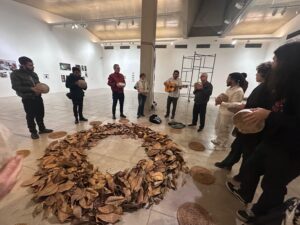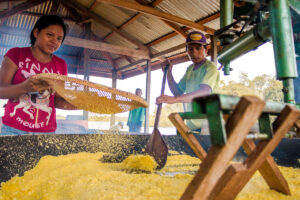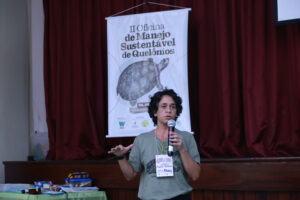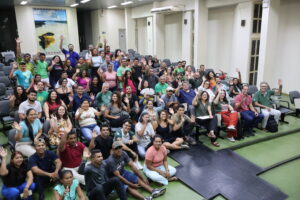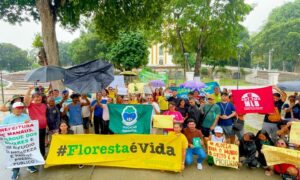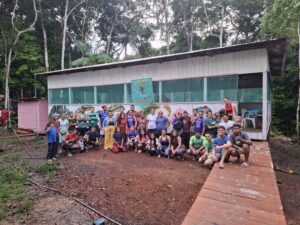Instituto Juruá was present at the most recent edition of the Mid Juruá Territory Forum meeting, which took place on June 17 and 18, 2022. This was the first face-to-face meeting after the coronavirus pandemic began.
By Letícia Araújo
The Mid Juruá Territory Forum (TMJ) is composed of organizations that act or are interested in acting in the Mid-Juruá. According to Eude Santiago, one of those responsible for the TMJ Forum Secretariat, the main objective is to “strengthen cooperation and integration between organizations and institutions operating in the Mi- Juruá, to promote the quality of life of traditional people and communities, value chains and the conservation of biodiversity in the Mid Juruá”.
The meeting aims to bring together TMJ Forum participants to discuss important points for the development and strengthening of the region. In this edition, there were several agendas that united the organizations.

On the first and second day there were presentations of the 2021-22 actions, initiatives and projects of each of the organizations present, starting with community-based ones and concluding with the other partners. In addition, updates were shared on the Mid Juruá Benefits Sharing Fund, the second cycle of the PTMJ (Mid-Juruá Territory Program) of 2021-24 and, an overview of the second edition of the Amazon Sustainable Landscapes 2 project, related to the Ramsar Site.
The meeting also had the sharing of two important studies for the territory: one on the “impacts and safeguards (ESG) of oil and gas exploration in the Mid-Juruá region” (Sitawi) and another on the “Meeting of Mid-Juruá Partners” (Human). Given the contributions of all those present, the need for evaluation of the Executive Secretariat of the Forum and the referrals for its self-development and its organizational maturity were raised on the agenda.
Nathália Messina, one of the representatives of Instituto Juruá at the meeting, explains that the IJ participated in the meeting through debates and questions, articulation with partners, including concomitant meetings and celebrations, and through the presentation of slides on the activities, projects and programs developed by the Institute between 2021 and 2022.

“Meetings like these help strengthen the collectivity and the governance of the forum in the convergence of projects, initiatives, and integrated actions, as well as in the leveling of knowledge on common themes for the partners, in joint analyses, in the exercise of debate and democracy, and in the defense of the territory and the people who inhabit it,” explained Nathália.
Twenty organizations, public and private, registered their presence at the meeting: TMJ Forum Secretariat; MJ Benefits Sharing Fund; Juruá Institute; Operation Native Amazon (OPAN); Sitawi; Humana; Natura; Chico Mendes Memorial; National Council of Extractive Populations (CNS); Carauari Rural Producers Association (ASPROC); Association of Agroextractivist Residents of the Uacari Sustainable Development Reserve (AMARU); Mixed Cooperative of Sustainable Development and Solidarity Economy of the MJ Resex (CODAEMJ); Association of Agroextractivist Women of the MJ (ASMAMJ); Association of Extractive Residents of the Community of São Raimundo (AMECSARA); Association of Agroextractive Residents of Lower Middle Juruá (AMAB);
Institute for Sustainable Agricultural and Forestry Development of the State of Amazonas (IDAM); Department of Climate Change and Conservation Unit Management/ State Secretariat of Environment (DEMUC/SEMA); Sustainable Amazon Foundation (FAS); Deutsche Gesellschaft für Internationale Zusammenarbeit/GmbH (GIZ Brazil) and PPA (Partners for the Amazon)/ United States Agency for International Development (USAID).


